Search the Blog
Categories
- Books & Reading
- Broadband Buzz
- Census
- Education & Training
- Friday Reads
- General
- Grants
- Information Resources
- Library Management
- Nebraska Center for the Book
- Nebraska Libraries on the Web
- Nebraska Memories
- Now hiring @ your library
- Preservation
- Pretty Sweet Tech
- Programming
- Public Library Boards of Trustees
- Public Relations
- Talking Book & Braille Service (TBBS)
- Technology
- Uncategorized
- What's Up Doc / Govdocs
- Youth Services
Archives
Subscribe
Author Archives: Susan Knisely
Friday Reads: The Future is History: How Totalitarianism Reclaimed Russia, by Masha Gessen
 Just over a month ago, on November 15, Masha Gessen’s The Future is History: How Totalitarianism Reclaimed Russia won the 2017 National Book Award for Nonfiction. Since my knowledge about Russia, which has been omnipresent in the news lately, is lacking, and since I’ve had positive experiences with nonfiction National Book Award winners in the past, I tracked down a copy. I’ve been working my way through it ever since.
Just over a month ago, on November 15, Masha Gessen’s The Future is History: How Totalitarianism Reclaimed Russia won the 2017 National Book Award for Nonfiction. Since my knowledge about Russia, which has been omnipresent in the news lately, is lacking, and since I’ve had positive experiences with nonfiction National Book Award winners in the past, I tracked down a copy. I’ve been working my way through it ever since.
Gessen, a journalist and LGBT rights activist, was born in Russia in 1967 and immigrated to the United States with her parents and siblings in 1981. After the collapse of the Soviet Union in 1991, she returned to Moscow, eager to report on new freedoms and opportunities in what appeared to be an emerging democracy. She returned to the United States in 2013, when anti-gay legislation and rhetoric posed a serious threat to her, personally, and to her rights as a gay parent.
The task Gessen sets for herself in this book is to document not only what has happened in Russia over the last 30 years, but also to explore the how and the why. As she states in her prologue, she wanted to tell the story of “[t]he crackdown, the wars, and even Russia’s reversion to type on the world stage,” but also “to tell about what did not happen: the story of freedom that was not embraced and democracy that was not desired.”
She does this in part by tracking the lives of seven real people (her “main characters” or “dramatis personae”). Four were born in the early- to mid-1980s, just before Mikhail Gorbachev declared glasnost (openness) and perestroika (restructuring). Their stories allow Gessen “to tell what it was to grow up in a country that was opening up and to come of age in a society shutting down.” The other three were older intellectuals—a psychoanalyst, a sociologist, and a philosopher–“who had attempted to wield [the intellectual tools of sense-making], in both the Soviet and post-Soviet periods.”
I’m usually all about the personal stories used to bring historical and political nonfiction to life. In The Future is History, however, I’m actually more taken with the expository writing that appears between check-ins with Gessen’s protagonists. That’s because Gessen, with her reporter’s background, is just so good at explaining complicated social, political, and historical dynamics.
There’s no way to provide an adequate synopsis of this book’s content in a six-paragraph blog post. But, if you’re like me and have only superficial knowledge of the subject matter, I can almost guarantee that time spent with The Future is History will pay huge dividends in terms of your Russian literacy. And given the current news cycle, you will start reaping the rewards immediately. My investment has paid off several times already – and that’s just in the last week!
Computers in Libraries Conference 2018 (April 17-19) Discount
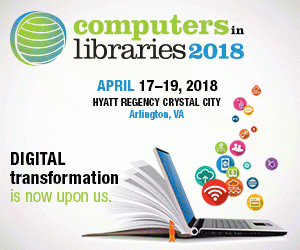 The Nebraska Library Commission is offering a group discount to all Nebraska librarians who attend the Computers in Libraries 2018 conference. This year it will be held at the Hyatt Regency Crystal City, Arlington, VA, on April 17-19, 2018. Detailed information about the conference can be found on the conference web page.
The Nebraska Library Commission is offering a group discount to all Nebraska librarians who attend the Computers in Libraries 2018 conference. This year it will be held at the Hyatt Regency Crystal City, Arlington, VA, on April 17-19, 2018. Detailed information about the conference can be found on the conference web page.
This year the Gold Pass will be available for the group rate of $599 (regular rate is $809). The Full 3-day Pass will be $339 (regular rate is $549). (No discount rates are available for the preconference seminars and workshops, unless purchased as part of a Gold Pass.)
In addition, discount prices of $599 (regularly $749) on the Library Leaders Summit (includes all three days of CIL), and $129 (regularly $219) on the Internet@Schools Track are also available.
To receive the discount you will need to register online using this link. Discounted rates should appear on the registration form. If you don’t see discounted rates on the form, please contact Susan Knisely for assistance.
Deadline: Online registrations can be made until March 16 to receive discounted rates.
Posted in Education & Training, Technology
Leave a comment
Join the Nebraska WebDewey Group Purchase
This is a good time of year to remind Nebraska librarians that they can save money on a subscription to WebDewey by participating in the Nebraska Dewey Group Purchase!
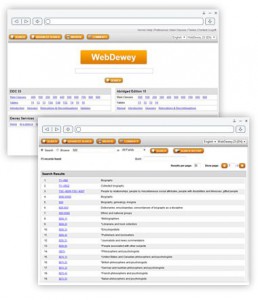 Dewey on the Web
Dewey on the Web
Enjoy web-based access to an enhanced version of the Dewey Decimal Classification (DDC) database through WebDewey. WebDewey includes all content from the recently discontinued print edition and features:
- Regular updates (new developments, new built numbers and additional electronic index terms)
- An easy-to-navigate, simple user interface that is suitable for the novice as well as the power user
- BISAC-to-DDC mappings
Our next WebDewey Group annual subscription will begin on January 1, 2018 and run through December 31, 2018. Libraries may join the Group at any time. Mid-term subscriptions will be prorated.
If your library is interested in subscribing to WebDewey, you’ll find pricing information on our online WebDewey Order Form.
To see WebDewey in action, try the WebDewey 2.0: An Overview tutorial.
If you have any questions about this group subscription opportunity, please contact Susan Knisely, 402-471-3849 or 800-307-2665.
Note: OCLC Membership is NOT required to purchase WebDewey.
Posted in General, Library Management, Technology
Leave a comment
OCLC Discontinues Publishing Print Editions of Dewey Decimal Classification (DDC)
According to information posted to the OCLC Dewey Services website, OCLC has decided to stop publishing English-language print editions of the Dewey Decimal Classification (DDC):
- The Dewey Decimal Classification (DDC) is frequently updated by the Dewey editorial team. These changes are available in WebDewey the next day. Consequently, print editions, with their multiyear publication cycles, became obsolete very quickly. In an effort to provide libraries with the most up-to-date information available, OCLC has decided to discontinue publishing English-language print editions of the DDC. This means that:
- OCLC will sell remaining copies of English-language print products based on DDC 23 (including Abridged 15 and 200 Religion Class) until June 2018 or until current copies are depleted.
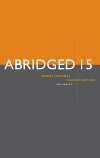 As of earlier this week, OCLC indicated that all English-language print copies of DDC 23 have been sold. English-language print copies of DDC Abridged 15 (well suited for the classification needs of libraries with up to 20,000 titles in their collections) are still available to purchase and will be sold until June 2018 or until current copies are depleted.
As of earlier this week, OCLC indicated that all English-language print copies of DDC 23 have been sold. English-language print copies of DDC Abridged 15 (well suited for the classification needs of libraries with up to 20,000 titles in their collections) are still available to purchase and will be sold until June 2018 or until current copies are depleted.
DDC Abridged 15 (print edition) can be ordered online through the Nebraska Library Commission while OCLC supplies last. The discounted price is available on the order form.
The Nebraska Library Commission also facilitates an annual group subscription to WebDewey, which allows you to:
- access the DDC and related information
- search or browse DDC numbers, Library of Congress Subject Headings (LCSH), Mapped MeSH and BISAC headings
- access authority records from links in the WebDewey records
- add your own notes and display them in context
You can learn more about about this group subscription on our OCLC Dewey Services page.
Posted in General
Leave a comment
Friday Reads: You Don’t Have to Say You Love Me, by Sherman Alexie
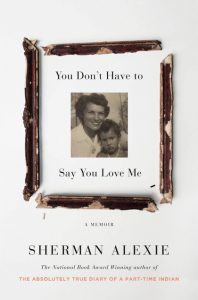 I am currently listening to the audio edition of You Don’t Have to Say you Love Me, a memoir by Sherman Alexie, written after his mother Lillian’s death in 2015. In it he wrestles not only with grief, but also with the regret, guilt, and bitterness that characterized his relationship with her.
I am currently listening to the audio edition of You Don’t Have to Say you Love Me, a memoir by Sherman Alexie, written after his mother Lillian’s death in 2015. In it he wrestles not only with grief, but also with the regret, guilt, and bitterness that characterized his relationship with her.
Born in 1966, Alexie grew up in Wellpinit, Washington, on the Spokane Indian Reservation. His family was poor, his dad often drunk and absent, his mother sober but sometimes cruel, and “On the reservation, violence [was] a clock, / Ordinary and relentless.” This is the formative experience that shapes all Alexie’s writing, but his power as a storyteller is his ability to craft a narrative both culturally specific and universal.
Speaking of the narrative, it is definitely not straightforward, and possibly not for everyone. The audiobook is read by Alexie, himself, which is a positive. He is known for his dramatic readings and has won slam poetry championships, so it’s doubtful any other narrator could own the material as he does. It has the feel of performance art, shifting seamlessly from prose with the texture of dramatic monologue, to poetry, to “rez accent” dialogue (Alexie recounts a conversation he once had with a white girlfriend, who said his mother had a “fancy accent.” When he tells her “[r]ez accents are the opposite of fancy,” she counters: “But rez accents make everything sound like music.”)
The stories Alexie tells aren’t presented chronologically, and even their authenticity is sometimes in doubt. In the first chapter alone there are multiple instances of family members questioning each other’s memories of how and if things happened. “You’re always making up stuff from the past,” his sister tells him. Even a writer friend teasingly accuses Alexie of being “the unreliable narrator of your own life,” for allegedly inventing a conversation between the two (about, of all things, storytelling and truth) and including it in the first chapter of his memoir. This is actually a perfect setup for Alexie’s subsequent examination of his relationship with his mother, a woman who told “many clever and clumsy lies,” as well as some that resonated with spiritual truth.
And that’s the thing about this memoir. Even if the anecdotes Alexie shares didn’t happen exactly as he remembers them, and even if one’s own life experiences and circumstances differ significantly from Alexie’s, the conflicted parental relationship he struggles with is recognizable and relatable, albeit uniquely described. That’s why I have appreciated this memoir so far and look forward to finishing it, though I don’t anticipate a particularly happy ending or any real resolution.
Alexie, Sherman. You Don’t Have to Say You Love Me. Ashland, OR: Blackstone Audio, 2017.
Internet Librarian Conference (October 23-25) Discount
 The Nebraska Library Commission is offering a group discount to all librarians in Nebraska who attend the 2017 Internet Librarian Conference. This year it will be held at the Monterey Marriott in Monterey, California, on October 23-25, 2017. Detailed information about the conference can be found on the conference web page at http://internet-librarian.infotoday.com/2017/
The Nebraska Library Commission is offering a group discount to all librarians in Nebraska who attend the 2017 Internet Librarian Conference. This year it will be held at the Monterey Marriott in Monterey, California, on October 23-25, 2017. Detailed information about the conference can be found on the conference web page at http://internet-librarian.infotoday.com/2017/
The price of the conference with the discount is $389 for the three-day event (regular rate is $549). That’s a $160 savings! In the past, no discount rates were available for the preconference workshops. This year, however, there is a Gold Pass available to groups at the discounted rate of $649 (regularly $789). (No discount rates are available for the separately priced preconference workshops.) In addition, the discount rate of $119 (regularly $209) on the Internet@Schools Track is also available.
To receive the discount you will need to register online using this link. Discounted rates should appear on the registration form. If you don’t see discounted rates on the form, please contact Susan Knisely for assistance. Online registrations can be made until September 22 to receive the discounted rates.
Posted in Education & Training, Technology
Leave a comment
Friday Reads: The Fire Next Time, by James Baldwin
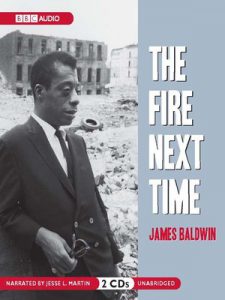 After watching I Am Not Your Negro, the Oscar-nominated documentary based on an unfinished James Baldwin manuscript, I finally tracked down and read Baldwin’s much-referenced 1963 book, The Fire Next Time. This book contains two essays: “My Dungeon Shook—Letter to my Nephew on the One Hundredth Anniversary of Emancipation,” and “Down At The Cross—Letter from a Region of My Mind.”
After watching I Am Not Your Negro, the Oscar-nominated documentary based on an unfinished James Baldwin manuscript, I finally tracked down and read Baldwin’s much-referenced 1963 book, The Fire Next Time. This book contains two essays: “My Dungeon Shook—Letter to my Nephew on the One Hundredth Anniversary of Emancipation,” and “Down At The Cross—Letter from a Region of My Mind.”
In the first essay, Baldwin endeavors to impart to his 15-year-old nephew the wisdom and advice he’ll need to survive growing up as a black man in America. Despite being “born into a society which spelled out with brutal clarity and in as many ways as possible that you were a worthless human being,” Baldwin urges his nephew to trust his own experience, to resist internalizing messages of inferiority, and to continue to love. And in a more sophisticated exhortation than our contemporary “Make America Great Again” slogan, Baldwin writes: “Great men have done great things here and will again and we can make America what America must become.” This essay actually served as inspiration for Ta-Nehisi Coates’s 2015 book, Between the World and Me, which took the form of a letter to his own teenage son. The tragedy, of course, is that such letters are still necessary.
The second essay, “Down At The Cross—Letter from a Region of My Mind,” is quite a bit longer than the first. In it Baldwin recounts his experiences with the Christian church during his youth and the Nation of Islam as an adult, seeing in neither a solution to the racial problems that infect America. Throughout, he offers an unsparing analysis of the problematic role race has played in the development of American civilization, “which compromises, when it does not corrupt, all the American efforts to build a better world…”
This essay is a demoralizing read because of how applicable Baldwin’s criticisms remain. “People are not, for example,” Baldwin writes, “terribly anxious to be equal (equal, after all to what and to whom?) but they love the idea of being superior.” And also: “It is rare indeed that people give. Most people guard and keep; they suppose that it is they themselves and what they identify with themselves that they are guarding and keeping, whereas what they are actually guarding and keeping is their system of reality and what they assume themselves to be.”
Baldwin’s writing is not without hope, but his is a bleak optimism–more philosophical choice than true faith. This perspective is powerfully captured in a 1963 television interview (“The Negro and The American Promise,” WGBH), in his response to a question about whether he is a pessimist or optimist: “I can’t be a pessimist because I’m alive. To be a pessimist means that you have agreed that human life is an academic matter, so I’m forced to be an optimist. I’m forced to believe that we can survive whatever we must survive.” As he did in his letter to his nephew, in this essay he holds out love as the only way forward. But he makes clear that when he uses the word “love” he is referring to “a state of being, or a state of grace—not in the infantile American sense of being made happy but in the tough and universal sense of quest and daring and growth.”
Baldwin, James. The Fire Next Time. Ashland, Oregon: Blackstone Audio, 2008.
Discounts on Books & Supplies
Midwest Library Service, a supplier of books to public, academic, and law libraries for nearly 60 years, would like to extend a discount offer on various book acquisitions and collection development services to Nebraska libraries.
The discount offer is effective through December 31, 2018 and includes:
- Free access to InterACQ (Midwest’s online acquisitions and collection development system)
- Free collection development tools including New Book Title Notifications
- Free ILS integration including MARC order records, EDI ordering and invoicing
- Trade Hardcover: up to 33%
- Trad & Mass Market Paperbacks: 10%
- University Press: 17%
- Science/Technology: 15%
- Standing Order: up to 10%
- Library Bindings: 5-15%
- Short Discounted Titles: 5%
- Net titles: 0%
For additional information about this offer, see the Nebraska Library Commission’s Discounts on Books & Supplies page. Click on the Midwest Library Service link to jump directly to the terms of this offer.
Posted in General
Leave a comment
Friday Reads: How to Survive a Plague: The Inside Story of How Citizens and Science Tamed AIDS, by David France
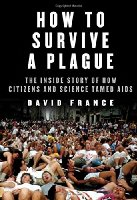 After watching Dallas Buyers Club several years ago, I wanted to learn more about the early treatment challenges that caused people with AIDS to criticize and bypass the FDA’s slow-moving and bureaucratic drug approval process. This led me to a copy of Randy Shilts’ classic 1987 book, And the Band Played On, which covered the AIDS epidemic through 1985. I hesitated to start it, however, because of the 25+ years of subsequent developments that wouldn’t be covered, including significant advances in treatment options in the mid-90s. So when David France’s How to Survive a Plague: The Inside Story of How Citizens and Science Tamed AIDS showed up on the New York Times “100 Notable Books of 2016” list, I jumped on it!
After watching Dallas Buyers Club several years ago, I wanted to learn more about the early treatment challenges that caused people with AIDS to criticize and bypass the FDA’s slow-moving and bureaucratic drug approval process. This led me to a copy of Randy Shilts’ classic 1987 book, And the Band Played On, which covered the AIDS epidemic through 1985. I hesitated to start it, however, because of the 25+ years of subsequent developments that wouldn’t be covered, including significant advances in treatment options in the mid-90s. So when David France’s How to Survive a Plague: The Inside Story of How Citizens and Science Tamed AIDS showed up on the New York Times “100 Notable Books of 2016” list, I jumped on it!
David France is an investigative reporter who has been covering AIDS since the early 1980s. He moved to New York City in June 1981, immediately after graduating from college and just weeks before a headline in the July 3 New York Times proclaimed “Rare Cancer Seen in 41 Homosexuals.” This put France at a major epicenter of the epidemic from its opening days—and from the very outset of his adult life. It is this embedded perspective that gives an intense intimacy to what is also a thoroughly researched and gripping account of the gay community’s mobilization to political and scientific activism and advocacy.
Although death and dying pervade France’s narrative, there is hope and inspiration in the formation of groups like Gay Men’s Health Crisis, ACT UP, with its rallying cry of “Drugs into bodies,” and TAG (Treatment Action Group). Members with an affinity for research, though lacking scientific background and in some cases without college degrees, educated themselves on the inner workings of government health agencies like the FDA, CDC, and NIH, and became experts on immunology and virology. This allowed them to challenge and ultimately collaborate as partners with a medical establishment used to patients passively accepting whatever treatment options were prescribed. They were able to press for an accelerated drug approval process, modifications in clinical trial protocol, reductions in drug costs, and more.
France’s account traces drug development through the January 1996 annual Conference for Retroviruses and Opportunistic Infections, where breakthrough results of two clinical drug trials were reported, heralding the arrival of new treatment options supporting long term survival of people with AIDS. Finally, AIDS no longer equaled death! While this is a victorious point at which to conclude his story, a happily-ever-after ending would have been inappropriate, and France avoids one with the final words of his final chapter: “It was not over. It would never be over. But it was over.” His epilogue also bears witness to the toll the plague took on surviving activists, often in the form of depression, drug addiction, underemployment and unemployment. Not only had they lost so many friends and lovers, they were now set adrift without purpose in a life they hadn’t prepared for, because they never expect to live to see it.
Although I still plan to read Shilts’ And the Band Played On, I’m glad I started with David France’s book; it provided me with the education I was looking for, in a compelling and thorough manner. If you’re interested in this topic but don’t want to tackle a 600+ page book (either Shilts’ or France’s), you may want to consider watching the 2012 documentary written and directed by France, also titled How to Survive a Plague. It is currently available to stream on Netflix.
France, David. How to Survive a Plague: The Inside Story of How Citizens and Science Tamed AIDS. New York: Knopf, 2016.
Rosen Database / eBook Trial + Plug for Trial Mailing List
Rosen Publishing is offering Nebraska libraries trial access to several databases and eBook sets, beginning February 1 and running through March 15, 2017.
Databases available for trial include:
- Teen Health & Wellness (Grades 7-12) — The award-winning Teen Health & Wellness database provides middle and high school students, with up-to-date, nonjudgmental, straightforward curricular, and self-help support. opics covered include diseases; drugs; alcohol; sex & sexuality; nutrition; mental health; suicide; bullying; LGBTQ issues; skills for school, work, and life; and more. Updated for 2016, Teen Health & Wellness features new content on bullying/cyberbullying, concussions, gender identity, human trafficking, social media, and more.
- PowerKnowledge Life Sciences (Grades 3-6+) — Covers key life science topics: animals, classification, endangered and extinct species, food chains and webs, green living, habitats and ecosystems, the human body, life cycles, plants, survival and adaptation.
- PowerKnowledge Earth & Space Science (Grades 3-6+) — Covers key earth and space science topics: earth cycles, ecosystems and biomes, energy and matter, landforms, maps, natural disasters, rocks and minerals, environmental issues, space, water, weather and climate.
- PowerKnowledge Physical Science (Grades 3-6+) — Covers key physical science topics, including atoms and molecules, elements and the periodic table, energy and matter, force and motion, and temperature and measurement.
Interactive eBook sets available for trial include:
- Spotlight on Kids Can Code (Grades 3-8)
- Spotlight on Earth Sciences (Grades 3-8)
- Spotlight On Ecology & Life Sciences (Grades 3-8)
- Spotlight On Space Science (Grades 4-7)
- Spotlight On Ancient Civilizations: Egypt, Greece, Rome (Grades 3-8)
- Spotlight On the Maya, Aztec, and Inca Civilizations (Grades 3-9)
- Spotlight On the Rise and Fall of Ancient Civilizations: China, India, Mesopotamia (Grades 5-10)
Trial access instructions (URLs, usernames, passwords) were distributed via a January 31, 2017 message to the Trial mailing list. Nebraska librarians who didn’t receive this information, or who would like to have it sent to them again, may contact Susan Knisely.
*** Note: Not all trial announcements are posted to this blog. If you are a Nebraska librarian and you’d like to receive future database trial announcements directly in your inbox, please make sure you are signed up for the Nebraska Library Commission’s Trial mailing list.
Posted in Information Resources, Technology
Leave a comment
Computers in Libraries Conference (March 28-30) Discount
 The Nebraska Library Commission is offering a group discount to all Nebraska librarians who attend the Computers in Libraries 2017 conference. This year it will be held at the Hyatt Regency Crystal City, Arlington, VA, on March 28-30, 2017. Detailed information about the conference can be found on the conference web page.
The Nebraska Library Commission is offering a group discount to all Nebraska librarians who attend the Computers in Libraries 2017 conference. This year it will be held at the Hyatt Regency Crystal City, Arlington, VA, on March 28-30, 2017. Detailed information about the conference can be found on the conference web page.
This year a new pass type is being introduced that includes workshops. This new pass, the Gold Pass, is being offered as part of the group discount at the rate of $589 (regular rate is $789).
The Full 3-day Pass will be $329 (regular rate is $549). No discount rates are available for the preconference seminars and workshops, unless purchased as part of a Gold Pass.)
In addition, discount prices of $599 (regularly $749) on the Library Leaders Summit (includes all three days of CIL), and $119 (regularly $209) on the Internet@Schools Track are also available.
To receive the discount you will need to register online using this link. Discounted rates should appear on the registration form. If you don’t see discounted rates on the form, please contact Susan Knisely for assistance.
The registration deadline is February 24 to receive the discounted rates.
Posted in Education & Training, Technology
Leave a comment
Join the Nebraska Dewey Group Purchase
This is a good time of year to remind Nebraska librarians that they can save money on the web and print versions of the Dewey Decimal Classification (DDC) system by participating in the Nebraska Dewey Group Purchase!
Dewey on the Web
Enjoy web-based access to an enhanced version of the Dewey Decimal Classification (DDC) database through WebDewey. WebDewey includes all content from the print edition and features:
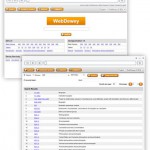 regular updates (new developments, new built numbers and additional electronic index terms)
regular updates (new developments, new built numbers and additional electronic index terms)- an easy-to-navigate, simple user interface that is suitable for the novice as well as the power user
- BISAC-to-DDC mappings
Our next WebDewey Group annual subscription term will begin on January 1, 2017 and run through December 31, 2017. Libraries may join the Group at any time. Mid-term subscriptions will be prorated. Orders must be received by the 15th of the month for a start date of the 1st of the following month.
If your library is interested in subscribing to WebDewey, you will find Pricing information on the online WebDewey Order Form.
To see WebDewey in action, try the WebDewey 2.0: An Overview tutorial.
Dewey in Print
The Nebraska Dewey Group includes the print versions of the Abridged Edition 15 (1 volume) and the 23rd edition of the unabridged Dewey Decimal Classification (4 volumes).
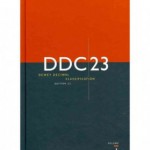 OCLC is offering group participants 10% off of the original list price on the DDC in print.
OCLC is offering group participants 10% off of the original list price on the DDC in print.
If your library is interested in ordering the DDC in print, you will find pricing information on the online Book Order Form.
For more information about the DDC, please visit Dewey Services.
If you have any questions about these Dewey products or the Nebraska Group, please contact Susan Knisely, 402-471-3849 or 800-307-2665.
NOTE: OCLC Membership is NOT required to purchase Dewey products.
Posted in General, Library Management, Technology, Uncategorized
Leave a comment
Friday Reads: Manhood for Amateurs, by Michael Chabon
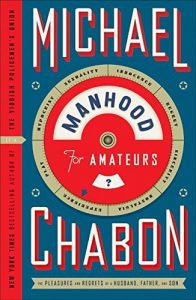 Michael Chabon is a Pulitzer Prize-winning novelist. He’s been on my radar for years, but I only recently sought out his work after running across a GQ article he wrote about attending Paris Fashion Week with his 13-year-old son. Because his account of the trip—a bar mitzvah present for his fashion-loving son, Abe—was so loving and insightful, I gravitated immediately to Chabon’s collection of personal essays, Manhood for Amateurs: The Pleasures and Regrets of a Husband, Father and Son, rather than his fiction.
Michael Chabon is a Pulitzer Prize-winning novelist. He’s been on my radar for years, but I only recently sought out his work after running across a GQ article he wrote about attending Paris Fashion Week with his 13-year-old son. Because his account of the trip—a bar mitzvah present for his fashion-loving son, Abe—was so loving and insightful, I gravitated immediately to Chabon’s collection of personal essays, Manhood for Amateurs: The Pleasures and Regrets of a Husband, Father and Son, rather than his fiction.
In Manhood for Amateurs, as the subtitle suggests, Chabon writes about the relationships he’s experienced and the roles he’s played as a boy and a man—son, brother, husband, son-in-law, father. The essays that resonate most with me are those in which he contemplates fatherhood, a role he clearly cherishes. I think I find them so touching because they echo back to me experiences and feelings I’ve had as a parent.
In “William and I” he laments how little it takes to be considered a good father today (still apparently not much more than taking your 20-month-old grocery shopping with you), compared to what it takes to be considered a good mother (“[p]erhaps performing an emergency tracheotomy with a bic pen on her eldest child while simultaneously nursing her infant and buying two weeks’ worth of healthy but appealing break-time snacks for the entire cast of Lion King, Jr.”). He clearly expects more from himself and expresses reverence at the intimacy you develop with your children as a result of the mundane, day-to-day tedium of raising them, especially through “your contact with their bodies, with their shit and piss, sweat and vomit, . . . with their hair against your lips as you kiss the tops of their heads, with the bones of their shoulders and with the horror of their breath in the morning as they pursue the ancient art of forgetting to brush.”
I think what I appreciate most about Chabon’s essays is their honesty, which is both humorous and poignant. In “The Memory Hole,” Chabon begins with an admission that he and his wife regularly throw away a large percentage of the flood of artwork his four children bring home from school. I can’t tell you what a relief it is to hear another parent admit to this. However, what begins as a self-deprecating account of how they try to manage the influx (“We don’t toss all of it. We keep the good stuff—or what strikes us, in the Zen of that instant between scraping out the lunch box and sorting the mail, as good.”), skillfully transitions into a meditation on how quickly childhood passes, how many moments we squander, and how few clear memories we carry forward with us into the future.
In “The Losers’ Club,” the introductory essay in Manhood, Chabon writes about his failed attempt, as a lonely boy in suburban Maryland, to convene a fellowship of likeminded individuals by founding the Columbia Comic Book Club. (No one attends the inaugural meeting, which results in it also being the final meeting.) It feels like a vindication, therefore, when in “The Amateur Family,” one of the last essays in the book, he describes himself as “the geek matrix of four bright geek spawn.” While this essay revolves around the family’s collective love of the Doctor Who television show, what it really celebrates is the fellowship Chabon shares with his children, and that they share with each other: “In the hands, minds, and geekish chatter of my children, I have found again that long-lost, long-desired connection. Each of us stands ready, at any moment, to talk Who, to riff and spin and sketch out new contours for the world we collectively inhabit, creating and endlessly re-creating the fandom that is our family.”
What I love most about “The Amateur Family” is Chabon’s understanding of the innate human drive to connect with others in “a shared universe of enthusiasm”; the fact that he ultimately finds this connection within his own family just makes the account that much more wonderful. Not surprisingly, his respect for and recognition of this impulse also featured prominently in the GQ article on taking his son to Fashion Week—which is what turned me on to this book of essays in the first place. In the GQ article, it’s Chabon’s appreciation of his son’s need to connect with people who share his love of fashion, an interest that Chabon doesn’t share, that I found so moving. He obviously respected his son’s obsession before the trip, or he wouldn’t have taken him on it; but by the end of the trip he gets it—and his son—in a whole new way.
If you like reading meditations on parenthood, I’d definitely recommend this collection of essays. And if you don’t have time to read whole book, at least check out the GQ article!
Chabon, Michael. Manhood for Amateurs: The Pleasures and Regrets of a Husband, Father, and Son. New York: HarperCollins, 2009.
Friday Reads: Grasshopper Jungle, by Andrew Smith
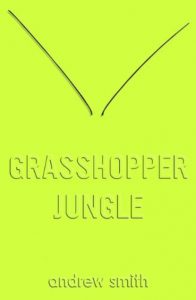 I first listened to Andrew Smith’s Grasshopper Jungle in fall 2015, and it instantly became my new favorite book! Since then I’ve read other Smith books (Winger, Stand-Off, 100 Sideways Miles, The Marbury Lens), and while I liked them all I’d have to say that Grasshopper Jungle stands out as something completely unique. As a piece of writing, it is distinctive – not just from Smith’s other books but from most other books I’ve read!
I first listened to Andrew Smith’s Grasshopper Jungle in fall 2015, and it instantly became my new favorite book! Since then I’ve read other Smith books (Winger, Stand-Off, 100 Sideways Miles, The Marbury Lens), and while I liked them all I’d have to say that Grasshopper Jungle stands out as something completely unique. As a piece of writing, it is distinctive – not just from Smith’s other books but from most other books I’ve read!
In part, this might be because Smith wrote it at a point in time when he had decided to get out of the business of writing for publication. “I never felt so free as when I wrote things that I believed nobody would ever see. Grasshopper Jungle was one of those things,” he confesses in the acknowledgements section of the book, which someone else evidently did read since they convinced him to publish it. (Publication was obviously a good idea: Grasshopper Jungle was a 2015 Michael L. Printz Honor Book.)
What the book is ostensibly about, versus what I love about it, are two different things. On the surface, this book is about an apocalyptic plague of six-foot-tall, man-eating praying mantises, accidentally unleashed in the fictional, economically-depressed town of Ealing, Iowa. What I love most are the main characters, sixteen-year-old Austin Szerba, who narrates, and his best friend, Robby Brees. They are, among other things, smart, sincere, loyal, witty, matter-of-fact, unflinching, hilarious, and respectfully profane.
One thing I particularly love about Austin is his obsession with history and truth, which are recurring themes throughout the book. Austin begins his narration with the following rumination on history:
I read somewhere that human beings are genetically predisposed to record history.
We believe it will prevent us from doing stupid things in the future.
But even though we dutifully archived elaborate records of everything we’ve ever done, we also manage to keep on doing dumber and dumber shit.
This is my history.
Austin has been recording his own history for years, as evidenced by the thigh-high stack of journals in his closet; and his book narration is a continuation of this process. Included in Austin’s stream-of-consciousness recitations are his thoughts on the nature of history, the act of recording it, and the impossibility of getting it all down. These thoughts, at least in my opinion, inform, and are reinforced by, the stylistic quirks that permeate Smith’s writing in this particular book.
These quirks include repetition of words and phrases to the point where they become epigrammatic refrains; use of an almost clinical, detached language to describe horrifying and distressing events; and Austin’s practice of reporting not just the main event, but also a multitude of other events that are occurring simultaneously, to other people, in other parts of the world. While this last quirk would be considered digression in another book, in Grasshopper Jungle it is a manifestation of Austin’s beliefs about how to report history in order to approach the truth. Austin’s girlfriend Shann describes his process thusly: “I love how you tell stories. I love how, whenever you tell me a story, you go backwards and forwards and tell me everything else that could possibly be happening in every direction . . . .”
Elsewhere, addressing the futility of this endeavor, Austin states: “You could never get everything in a book. Good books are about everything;” and “Even when I tried to tell everything that happened, I knew my accounts were ultimately nothing more than an abbreviation.”
Austin is as devoted to telling the truth as he is to accurately recording history. To others, he never lies, especially if asked a direct question. The most he sometimes does is not volunteer the whole truth. (About a partial truth he told his parents, he says: “It wasn’t a lie; it was an abbreviation.”) From himself, he hides nothing, even if the truth is embarrassing or confusing. It’s why he doesn’t shy away from the realization that he is in love with, and sexually attracted to, both his best friend Robby, who is gay, and his girlfriend, Shann. He might not know what to do about these feelings, he might not know what they mean, but he never tries to lie to himself about them.
I also love the fact that Austin and Robby have favorite poems, which they recite out loud to each other. According to Austin:
Robby’s favorite poem is Dulce Et Decorum Est by Wilfred Owen. It is a poem about war and lies, youth and thievery. . . .
My favorite poem is The Emperor of Ice-Cream by Wallace Stevens. It is a poem about everything else: sex, lust, pleasure, loneliness, and death. . . .
Because favorite poems often reveal something about character, and because I suspected they might reinforce the underlying themes of the book, I sought them out to read in their entirety. Although very different on the surface, both call on readers to reject artifice and sentimentality in favor of seeing things exactly as they are – at least to the extent humanly possible. In “Dulce Et Decorum Est” a gruesome description of a World War I soldier choking to death on poisonous gas is presented in stark contrast to the slogan (“That old Lie”) used to encourage young men to enlist at the start of the war: “Dulce et decorum est / Pro patria mori.” (The Latin phrase, borrowed from Horace, can be translated as “it is sweet and right to die for your country.”) And in “The Emperor of Ice-Cream” we are told to “Let be be finale of seem.” This philosophy definitely informs Austin’s approach to recording history, as evidenced by the matter-of-fact tone and blunt language he favors in his narration, along with his commitment to objectivity: “I do not know why, but that is not my job. My job is saying what.”
If you like quirky, irreverent books with absurd plots, which also have depths you can plumb, Grasshopper Jungle might be for you. As Andrew Smith said in a February 18, 2014 interview with Walter Heymann, “. . . Grasshopper Jungle is very realistic, but at the same time, it’s absolutely ridiculous. It’s the same way our world is.”
Smith, Andrew. Grasshopper Jungle. New York: Dutton, 2014.
Internet Librarian Conference (October 17-19) Discount
 The Nebraska Library Commission is offering a group discount to all librarians in Nebraska who attend the 2016 Internet Librarian Conference. This year it will be held at the Monterey Marriott in Monterey, California, on October 17-19, 2016. Detailed information about the conference can be found on the conference web page at http://internet-librarian.infotoday.com/2016/
The Nebraska Library Commission is offering a group discount to all librarians in Nebraska who attend the 2016 Internet Librarian Conference. This year it will be held at the Monterey Marriott in Monterey, California, on October 17-19, 2016. Detailed information about the conference can be found on the conference web page at http://internet-librarian.infotoday.com/2016/
The price of the conference with the discount is $379 for the three-day event (regular rate is $549). That’s a $170 savings! (No discount rates are available for the pre-conference workshops.)
In addition, the discount price of $109 (regularly $219) on the Internet@Schools Track is also available.
To receive the discount you will need to register online using this link. Discounted rates should appear on the registration form. If you don’t see discounted rates on the form, please contact Susan Knisely for assistance. Online registrations can be made until September 16 to receive the discounted rates.
Posted in Education & Training, Technology
Leave a comment
Friday Reads: Tell the Wolves I’m Home, by Carol Rifka Brunt
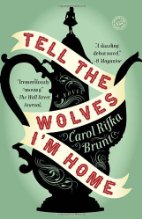 I think my colleagues will be glad that I’m finished with this book, as I’ve been an emotional wreck every afternoon after listening to another installment over my lunch hour. The story is set in 1987, in and around New York City, at the height of the AIDS epidemic. Several chapters in, 14-year-old June Elbus’s beloved uncle and godfather, Finn, dies of the disease. Fractures between June and her 16-year-old sister, Greta, which began prior to Finn’s death, open further, leaving each alone with her unique pain. And June’s mother, Finn’s sister, is so caught up in her own grief and resentment that she doesn’t see how her personal issues have contributed to her daughters’ crises.
I think my colleagues will be glad that I’m finished with this book, as I’ve been an emotional wreck every afternoon after listening to another installment over my lunch hour. The story is set in 1987, in and around New York City, at the height of the AIDS epidemic. Several chapters in, 14-year-old June Elbus’s beloved uncle and godfather, Finn, dies of the disease. Fractures between June and her 16-year-old sister, Greta, which began prior to Finn’s death, open further, leaving each alone with her unique pain. And June’s mother, Finn’s sister, is so caught up in her own grief and resentment that she doesn’t see how her personal issues have contributed to her daughters’ crises.
A major catalyst for the emotional drama of the story is the secret June’s mother forced Finn to keep from June as a condition of him being allowed to be a part of her life: the very existence of his beloved partner Toby, with whom he shared his apartment and life. June learns of Toby’s existence at Finn’s funeral, when her mother spots him outside the funeral parlor, and her father tells June and Greta to alert him if “that man” tries to enter the building.
Several weeks after the funeral, Toby contacts June with a gift from Finn and a request to meet secretly, as she is, according to his note, “perhaps the only person who misses Finn as much as I do…” Thus begins a tentative and covert friendship, orchestrated in part, we find out, by Finn, which brings both comfort and additional pain to June.
What totally guts me about this book is the degree to which pain begets pain, especially between people who love each other. Greta’s pain, an outgrowth of her growing estrangement from June, along with pressure from her mother to not pass up any opportunities, even those she’s not ready for, leads her to cruelly and repeatedly lash out at June – behavior that, counterproductively, just causes more pain and further estrangement.
Similarly, the pain June and Greta’s mother holds on to from her own past – the abandonment she felt when Finn left home at seventeen; her jealousy and regret over the fact that he became the famous artist in New York City, while she wound up an accountant in the suburbs – leads to her irrational ultimatum about Toby, and its cascade of consequences. Her goal may have been to hurt Toby and teach Finn he “couldn’t have everything,” but her daughter June suffers significant collateral damage. Disoriented upon learning how much she didn’t know about Finn, June questions the very foundation of their relationship – essentially losing him twice. And even though she gets some of Finn back through Toby, she struggles with feelings of humiliation at having thought herself the most important person in Finn’s life at a time when everyone else knew he had Toby.
While this book doesn’t come with a “happily ever after” ending, it does suggest that, moving forward, there is hope for redemption and reconciliation for June, Greta, and their mother. Perhaps more significantly, it serves as a powerful reminder to those of us muddling through the mess of our own lives to resist acting out of pain and instead choose love.
Brunt, Carol Rifka. Tell the Wolves I’m Home. New York: Dial Press, 2012.
Computers in Libraries Conference (March 8-10) Discount
 The Nebraska Library Commission is offering a group discount to all Nebraska librarians who attend the Computers in Libraries 2016 conference. This year it will be held at the Washington Hilton, Washington, D.C., from March 8-10, 2016. Detailed information about the conference can be found on the conference web page.
The Nebraska Library Commission is offering a group discount to all Nebraska librarians who attend the Computers in Libraries 2016 conference. This year it will be held at the Washington Hilton, Washington, D.C., from March 8-10, 2016. Detailed information about the conference can be found on the conference web page.
The price of the conference with the discount is $319.00 for the three-day event (March 8-10). The non-discounted rate is $549, so this is a $230 savings! No discount rates are available for the preconference seminars and workshops.
In addition, discount prices of $599 (regularly $749) on the Library Leaders Digital Strategy Summit (includes all three days of CIL), and $109 (regularly $209) on the Internet@Schools Track are also available.
To receive the discount you will need to register online using this link. Discounted rates should appear on the registration form. If you don’t see discounted rates on the form, please contact Susan Knisely for assistance. The registration deadline is February 5 to receive the discounted rates.
Posted in Education & Training, Technology
Leave a comment
Friday Reads: Becoming Nicole: The Transformation of an American Family, by Amy Ellis Nutt
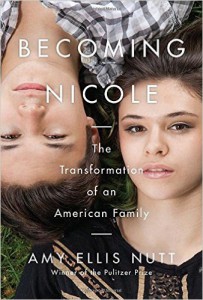 Becoming Nicole: The Transformation of an American Family, was released on October 20, 2015, two weeks before the Houston Equal Rights Ordinance was defeated in large part due to fears generated over bathroom access by transgender individuals. I learned about the book through the flurry of news coverage immediately preceding its release, and I was first in line for Lincoln City Library’s print copy. Written by Amy Ellis Nutt, it tells the story of the Maines family who, in January 2014, won a landmark civil-rights case against the Orono school district after school officials denied their transgender daughter Nicole the right to use the girls’ restroom.
Becoming Nicole: The Transformation of an American Family, was released on October 20, 2015, two weeks before the Houston Equal Rights Ordinance was defeated in large part due to fears generated over bathroom access by transgender individuals. I learned about the book through the flurry of news coverage immediately preceding its release, and I was first in line for Lincoln City Library’s print copy. Written by Amy Ellis Nutt, it tells the story of the Maines family who, in January 2014, won a landmark civil-rights case against the Orono school district after school officials denied their transgender daughter Nicole the right to use the girls’ restroom.
The value of this book at a time when every news story about transgender rights results in a flurry of mean-spirited comments is that it tells the story of a transgender child and her family from day one. It allows those of us who have no personal experience with being transgender or raising a transgender child to glean, just a little bit, through the power of story and the willingness of the Maines’ family to share theirs, what it might be like.
The story begins in 1997 when Wayne and Kelly Maines adopted identical twin boys named Wyatt and Jonas. Despite having the same DNA and being raised in the same household, the boys identify differently from early on. Even before he’s three Wyatt prefers girl things and displays distress over being treated as a boy. The anecdotes shared to illustrate this early dissonance are poignant and heartrending.
By the time the boys are three Kelly is already doing research, trying desperately to understand what is going on with Wyatt. Wayne, on the other hand, is deeply uncomfortable with Wyatt’s gender nonconformity and disapproves of Kelly’s willingness to partially accommodate the boy’s toy and clothing preferences. Although Wayne clearly loves both boys, his initial response is to withdraw and leave the reins primarily in Kelly’s hands.
Interestingly enough, at least early on the boys’ friends and classmates had the fewest problems with their differing gender identities: Wyatt had no problem making female friends and bonding with them over “girl” things; the son of a family friend contradicted his mother when she referenced the “Maines boys,” telling her that Jonas is a boy and Wyatt is a girl; and at one point, when the twins are nine, Jonas tells his dad to face the fact that he has a son and a daughter.
It wasn’t until fifth grade, when the grandfather of a classmate complained about a boy using the girls’ restroom, something Wyatt (now Nicole) had been doing with school approval for some time, that things got bad. In response to the complaint and ongoing harassment by the boy whose grandfather had lodged it, the school eventually told Nicole she had to use a staff restroom. The continuing conflict and increasingly hostile school climate began to take a toll on the family, and in 2009 they decided Kelly and the twins would relocate to Portland. They also filed their initial lawsuit against the school district.
Although this was a difficult time for the family financially and emotionally, it was also a turning point for Wayne who realized he needed to step up to the plate and begin advocating for his daughter. He became the more public face of the family, eventually giving speeches, writing letters and essays that appear in national publications, and lobbying politicians. In this sense, the story of Nicole’s transformation is also the story of her father’s transformation as he opened himself to a reality unfolding in front of him that contradicted his expectations and beliefs.
Nutt, Amy Ellis. Becoming Nicole: The Transformation of an American Family. New York: Random House, 2015.
Join the Nebraska Dewey Group Purchase
This is a good time of year to remind Nebraska librarians that they can save money on the web and print versions of the Dewey Decimal Classification (DDC) system by participating in the Nebraska Dewey Group Purchase!
Dewey on the Web
Enjoy web-based access to an enhanced version of the Dewey Decimal Classification (DDC) database through WebDewey. WebDewey includes all content from the print edition and features:
 regular updates (new developments, new built numbers and additional electronic index terms)
regular updates (new developments, new built numbers and additional electronic index terms)- an easy-to-navigate, simple user interface that is suitable for the novice as well as the power user
- BISAC-to-DDC mappings
Our next WebDewey Group annual subscription term will begin on January 1, 2016 and run through December 31, 2016. Libraries may join the Group at any time. Mid-term subscriptions will be prorated. Orders must be received by the 15th of the month for a start date of the 1st of the following month.
If your library is interested in subscribing to WebDewey, you will find Pricing information on the online WebDewey Order Form.
To see WebDewey in action, try the WebDewey 2.0: An Overview tutorial.
Dewey in Print
The Nebraska Dewey Group includes the print versions of the Abridged Edition 15 (1 volume) and the 23rd edition of the unabridged Dewey Decimal Classification (4 volumes).
 OCLC is offering group participants 10% off of the original list price on the DDC in print.
OCLC is offering group participants 10% off of the original list price on the DDC in print.
If your library is interested in ordering the DDC in print, you will find pricing information on the online Book Order Form.
For more information about the DDC, please visit Dewey Services.
If you have any questions about these Dewey products or the Nebraska Group, please contact Susan Knisely, 402-471-3849 or 800-307-2665.
NOTE: OCLC Membership is NOT required to purchase Dewey products.
Posted in General, Library Management, Technology, Uncategorized
Leave a comment
Friday Reads: Boys Don’t Knit (In Public), by T.S. Easton
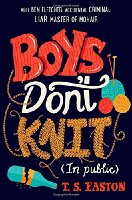 “Meet Ben Fletcher: Accidental criminal. Liar. Master of mohair.” So proclaims the cover of UK author T.S. Easton’s delightfully silly YA novel Boys Don’t Knit. Ben Fletcher is a 17-year-old good kid and worrier, who gets drawn into an act of juvenile delinquency by his misfit friends. Ironically, considering he was the most reluctant participant, and due in part to a series of unfortunate circumstances, Ben winds up in the most trouble when they’re caught. Placed on probation, Ben is required to keep a journal (hence the diary-format of the novel) and to take an evening class at the local community college.
“Meet Ben Fletcher: Accidental criminal. Liar. Master of mohair.” So proclaims the cover of UK author T.S. Easton’s delightfully silly YA novel Boys Don’t Knit. Ben Fletcher is a 17-year-old good kid and worrier, who gets drawn into an act of juvenile delinquency by his misfit friends. Ironically, considering he was the most reluctant participant, and due in part to a series of unfortunate circumstances, Ben winds up in the most trouble when they’re caught. Placed on probation, Ben is required to keep a journal (hence the diary-format of the novel) and to take an evening class at the local community college.
Due to limited choices, he winds up as the only male student in an introductory knitting class. (Other options included a car maintenance class taught by his father; pottery taught by the mother of a female classmate he has a crush on; and Microsoft Office for beginners, which he describes as being “for grannies and people who’ve just arrived in civilization after having been raised by wolves in the Appalachians.”) The challenge for Ben is how to keep his participation in the knitting class a secret from his father, who wants Ben to share his manly interest in soccer, cars, and World War II, and his classmates.
Of course, Ben winds up being a natural talent at knitting, so much so that he is drafted to participate in the regional heat of the All-UK Knitting Championship, in the junior category. He also ends up REALLY LIKING knitting, not only the social aspects of class, but also the calming effect it has on his mind. It begins to take over his life: He listens to knitting podcasts; furtively reads knitting magazines at the store (hiding a girly magazine inside the knitting magazine when he sees his friends approaching so they’ll think that’s what he’s really looking at, when it’s actually the other way around); and even sets up an Etsy shop. Eventually, despite his best efforts, he’s “outed” at school by an administrator wanting to capitalize on his success as a young entrepreneur. As you can imagine, this leads to constant ribbing from friends and enemies alike, and while it is painful to Ben it makes for amusing reading.
There is a lot of humorously cringe-worthy material in this book (intentional on the part of the author) which we, the readers, get to experience along with Ben (though as readers we are in a better position to be tickled by it than Ben). This includes conversations between Ben’s parents, which are filled with food-based double entendres that used to go over Ben’s head but now cause him no end of psychic pain. We also get to read excerpts of his friend Joz’s horribly-written novel-in-progress, titled Fifty Shades of Graham, which he’s having Ben proofread. It contains winning lines such as “Her large chest heaved angrily at me.” All in all, Ben has a lot of crosses to bear. His voice, as he shares his experiences with us via his diary entries, is as delightful and appealing as can be, making this a wonderful romp of a read.
Easton, T.S. Boys Don’t Knit (In Public). New York: Feiwel and Friends, 2015.

